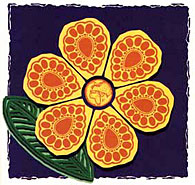 |
|
|
 Food, Farming, and Women's Leadership in Africa: Using Electronic
Communications and Training to Change Perceptions and Realities Food, Farming, and Women's Leadership in Africa: Using Electronic
Communications and Training to Change Perceptions and Realitiesby Sarah Tisch <sjt@winrock.org> and Ken Herman <kherman@winrock.org> The computers are stuck in customs. The network and power cabling are almost done, as they have been for a few weeks. Our server hasn't arrived, but the vendor is lending us one. At least a dozen telephone engineers have been in and out of the office during the week working on our Internet connectivity, which is still an unconnected cable in our telephone closet. Such are the challenges of establishing a high-tech training center in Abidjan, the striking capital of the West African nation of Ivory Coast. We've been working on this a long time, and we can see the end in sight. But let's go back to the beginning. Our journey begins with farmers and food production--specifically, with the needs of African women, who although not the landowners on this continent, surely are responsible for most of the farming. And farming means food. It's not difficult to understand that for an economy to develop, citizens need to spend less time looking for food and more time going to school, building businesses, and, in general, living. Access to information and a context in which to use it are key to the improvement of poor, disenfranchised people. In developing economies there are many constraints to the improvement of life: economic, social, political, and physical. In many cases, those constraints can be addressed by making resources, technology, and information accessible to those who need them most. On the African continent, as in other parts of the world, women have even more difficulty than men in accessing resources. Winrock International, a nonprofit, nonsectarian organization dedicated to reducing poverty and hunger through sustainable agriculture, natural resource management, and renewable energy, is addressing that problem. Key Ingredients: Leadership Training and Communication One solution to the problem came in the form of the African Women's Leaders in Agriculture and Environment (AWLAE) project, a consortium of nongovernmental organizations (NGOs) developed by Winrock and formed to support female farmers in Africa. A critical component of the AWLAE project is a scholarship program that provides support for women in the areas of agriculture and environment to pursue advanced degrees in agriculture. The idea is to create a cadre of highly trained women in agricultural sciences who will work in their countries and regions and devote their efforts to solving the problems faced by female farmers and rural households. To be effective, AWLAE NGOs need to communicate and to share technical and management information. In response, Winrock, working closely with California Polytechnical Institute Pomona, developed a distance-learning strategy--called the electronic learning network (ELN)--that includes not only creation of CD-ROM-based training modules but also integration of e-mail and access to electronic discussion groups. Working in teams of 25 AWLAE scholars and long-term AWLAE program participants, ELN students will go through a 10-unit interactive course based on the Harvard case study method, wherein participants interact with each other to solve problems. The professional training provided by the ELN in leadership, management and applied-Internet-use skills is likely to increase communication among women leaders and expand the amount of African-based and African-generated materials available on the Internet. In addition, the participants of the program, including women in four West African countries--Benin, Ivory Coast Mali, and Senegal--and three East African countries--Kenya, Tanzania, and Uganda, with Ethiopia to follow in several years--will benefit from an ongoing colearning process. As the content of the CD-ROM is driven by the information needs and interests of the women leaders of the program, a team of Cal Poly-Pomona and Winrock staff went to Abidjan in July 1997 to meet with both project participants and Winrock regional office staff. Discussions also were held with computer vendors, NGOs, the African Development Bank, U.S. government officials, and the one Internet service provider (ISP) in the region at the time, AfricaOnline. Through those meetings, we discovered a unique niche that Winrock could fill by providing training in applied Internet use and related presentation software such as PowerPoint, Director, Quark Xpress, Photoshop, and HTML. Because we needed to support the AWLAE participants with Internet training, we could extend that training to others in the country and the region. Training Center Takes Shape AfricaOnline expressed a keen desire to work with Winrock and offered to provide affordable Internet accounts for the electronic learning network in exchange for in-depth training in Internet use for its customers. We felt there was a real opportunity to have a long-term development impact by providing training for AfricaOnline subscribers and other NGOs. At the same time, Winrock reached an agreement with Cal Poly that would allow us to provide certificates using the Cal Poly name for four levels of Internet and presentation software use. The training center was beginning to take shape. We began preparing a rigorous business plan outlining ways to meet the needs of the AWLAE and how those solutions could dovetail with the needs of many of Winrock's other clients. We decided to focus on two areas: (1) offering value-based applied training in accessing Internet resources and using the Internet to expand the capacity of NGOs in networking and (2) creating multimedia materials for development-related activities. The need for those services extends to public institutions, ministries, universities, development organizations such as the African Development Bank, and the private sector. In addition to accessing the Internet, Africans need to be posting their own materials on the World Wide Web. Even though there are computer software training courses available in Abidjan and other West African capital cities, ISPs generally provide only one or two hours of training by their technicians during service hookup. We found no organization that provides training in the applied use of the Internet, in which the use of software is learned within an applied, context-rich environment for development purposes, especially targeting NGOs. Understanding the Regional Context In several West African Francophone countries, governments are transferring a significant part of their responsibility in the development process to NGOs and organizations at the community and grassroots levels. The number of NGOs is growing rapidly, as is the need to train staff and strengthen institutions. In Mali, there are roughly 500 NGOs, 300 in Benin, 250 in Senegal, and 100 in Ivory Coast. As the local government ministries, the African Development Bank, and other UN-related and bilateral donor organizations link to the Internet, NGOs have a golden opportunity via Web pages and discussion groups to inform their donors and policy makers of their activities. The ability to disseminate information about NGOs by NGOs needs to be developed. The Winrock Training Center represents a response to the growing demand for training in community development, institutional building, and management of development projects. Regional demand for electronic learning networks also is increasing based on the diffusion of new information technology in West Africa. Governments, NGOs, and private- sector organizations feel the need to work in a network for sharing and disseminating information. ISPs have a growing number of clients, and their businesses are expanding. The effort is greatly assisted by the first successes of the U.S. government's Leland initiative--an effort to privatize telecommunications, reduce value-added taxes on computers, and increase the number of ISPs to expand access to the Internet on the African continent. Nuts and Bolts The Winrock West Africa Regional Center for Excellence in Leadership, Applied Technology and Development (TC) is now a nonprofit, computer-equipped training center housed at the Winrock office in Abidjan. The center will provide capacity-building training in development skills: gender analysis, leadership, NGO management, community assessment, and information technology. The hallmark of the center is a four-tiered course in the applied use of information software and multimedia computer technology to enhance use of the Internet by African NGOs. The capacity of the center is modest due to limited resources and the relatively high cost of computer equipment in-country. Because the space available for training also is limited, we decided to use laptops. The training center facility must accommodate computer-based as well as noncomputer-based training and conferences. The laptops enabled us to clear out the computer equipment and make space. We did, however, buy port replicators for the machines so students could use full-size keyboards, monitors, and mice. Rounding out the technical capacity of the center is the usual complement of server, high-capacity printer, scanner, and cabling, which are expected to be done "real soon now." Working with our ISP partner, we negotiated a competitive rate for a 64K full-time connection to the Internet.
For more information, email Mme Reine Boni, West African Regional Projects and AWLAE Coordinator, or Mr.
Isidore Bouchure, Training Center Manager, Winrock International
Institute for Agricultural Development at 001-225-41-94-27. But all the cabling and hardware in the world would be useless without skilled trainers. The center recently hired a training director and a technical support specialist, and we work with other part-time trainers in the country. We now have a training staff of five Ivorians and one from Burkino Faso, all of whom have received intensive training at Cal Poly-Pomona. Difficulties in building the center illustrate the newness of the Internet in West Africa. Versatile computers had to be identified and purchased using scare funds. French-language presentation software had to be purchased for each workstation. The computers had to be purchased before the promised reduction in the value-added tax, and Winrock had to go through a laborious process of applying for duty-free status to release the computers from customs. A new phone line had to be installed to accommodate the AfricaOnline connection. New air conditioners and security systems have been installed. Conclusion The center, formally opens in October 1998 and is expected to
be running at full capacity by the end of 1999. It can be accessed
electronically for information and resources, analytic tools related
to needs assessment and impact measurement, job opportunities
for women, and training materials. Interest in the training that
Winrock offers at the center is growing, and inquiries now are
received on a daily basis. Most important, we expect to see a
blossoming of African content on the Web, which will change perceptions
of how problems of poverty in Africa are addressed by Africans.
We expect to see an increase in communication and a move toward
true collaboration and partnership with Africans as they become
more integrated into the global economy and Internet community.
By the training of women's NGOs and by the targeting of African
NGOs for Internet training--forces that have demonstrated their
potential to stimulate real change--the opportunities to make
a difference in rural Africa can get amplified beyond the current
reality. |

